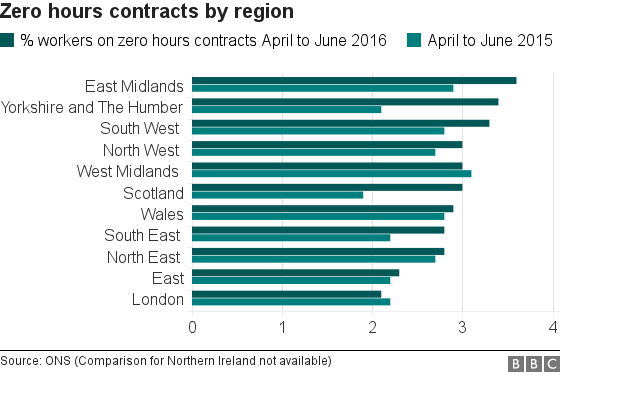Zero-hours contracts rise to 903,000 workers
- Published

The number of people saying they are on zero-hours contracts has risen, according to official figures.
The Office for National Statistics (ONS) said, external there were about 903,000 people whose main job did not guarantee a minimum number of hours between April and June.
That's up 21% from the figure of 747,000 for the same period last year.
It means that 2.9% of people in employment are on such contracts, compared with 2.4% last year.
Shops, hotels and care homes are among the businesses that use zero-hours contracts.
Frances O'Grady, general secretary of the TUC, said: "If you don't know how much work you will have from one day to the next, paying the bills and arranging things like childcare can be a nightmare."
The Resolution Foundation said some workers favoured the flexibility, but the think tank called on the government to provide more help for people with insecure working conditions.
A Department for Business spokesman that almost 70% of workers on zero-hours contracts were happy with the number of hours they work.

The ONS releases this data twice a year - the figure for October to December 2015 showed that about 801,000 people were on zero-hours contracts.
However, that figure is not comparable with the latest number because it is likely that the use of such contracts is affected by the time of year.
The ONS usually also releases a figure based on a business survey, indicating how many zero-hours contracts have been issued for work done over a particular period.
Last November there were 1.7 million such contracts, but the ONS has had a data collection problem this time and so has delayed the updating of this figure.

Sports Direct has promised to scrap zero-hours contracts for casual retail staff
Big survey
The figure for the number of people saying their main job is on a zero-hours contract comes from the Labour Force Survey, in which the ONS speaks to about 40,000 households every quarter.
As it is based on people's responses, it is sensitive to whether people are aware that they are on zero-hours contracts.
The ONS warns that the figures may have been influenced by greater awareness of the contracts, although it could not quantify how much of an effect there had been.
Because the figures are based on a survey, even a very large survey, they are not precise figures.
The ONS is 95% confident that the figure of 903,000 is right within plus or minus 68,000. That means the rise of 156,000 is statistically significant.
- Published9 March 2016

- Published2 September 2015

- Published1 April 2015
